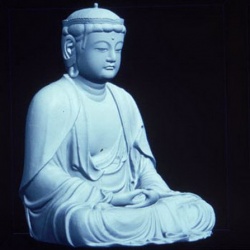Buddha Sermon on the Not-Self Characteristic
The Anattalakkhana Sutta, Samyutta Nikaya XXII, 59
From an internet site (locating...).
One of the most important, and hard to grasp, of all all Buddhist teachings is the doctrine of anatta, or "no-self". One of Sakyamuni Buddha's teachings about the cause of suffering was that it was a result of false illusions about the self. The self, or soul, or "essential person", was an illusion. Thus Buddhism does not teach that "you" are "soul" which is "reborn" (although certain forms of Hindu teaching may be understood in this way. Rather Buddhism teachers the "Mind" and "Mindfulness" exist, and that there is a karmic continuity between incarnations of mind. The link then is karmic, not essential. The Anattalakkhana Sutta is a document from the Pali canon of Buddhist scriptures in which the Buddha argues for this idea.
I have heard that on one occasion the Blessed One was staying at Varanasi in the Game Refuge at Isipatana. There he addressed the group of five monks:
'The body, monks, is not self. If the body were the self, this body would not lend itself to dis-ease. It would be possible (to say) with regard to the body, "Let my body be thus. Let my body not be thus." But precisely because the body is not self, the body lends itself to dis-ease. And it is not possible (to say) with regard to the body, "Let my body be thus. Let my body not be thus."
'Feeling is not self.... Perception is not self.... Mental processes are not self....
'Consciousness is not self. If consciousness were the self, this consciousness would not lend itself to dis-ease. It would be possible (to say) with regard to consciousness, "Let my consciousness be thus. Let my consciousness not be thus." But precisely because consciousness is not self, consciousness lends itself to dis-ease. And it is not possible (to say) with regard to consciousness, "Let my consciousness be thus. Let my consciousness not be thus."
'How do you construe thus, monks--Is the body constant or inconstant?' 'Inconstant, Lord.' 'And is that which is inconstant easeful or stressful?' 'Stressful, Lord.' 'And is it fitting to regard what is inconstant, stressful, subject to change as: "This is mine. This is my self. This is what I am"?' 'No, Lord.'
'...Is feeling constant or inconstant?.... Is perception constant or inconstant?.... Are mental processes constant or inconstant?....
'Is consciousness constant or inconstant?' 'Inconstant, Lord.' 'And is that which is inconstant easeful or stressful?' 'Stressful, Lord.' 'And is it fitting to regard what is inconstant, stressful, subject to change as: "This is mine. This is my self. This is what I am"?'
'No, Lord.'
'Thus, monks, any body whatsoever--past, future, or present; internal or external; blatant or subtle, common or sublime, far or near: every body--is to be seen as it actually is with right discernment as: "This is not mine. This is not my self. This is not what I am."
'Any feeling whatsoever.... Any perception whatsoever.... Any mental processes whatsoever....
'Any consciousness whatsoever--past, future, or present; internal or external; blatant or subtle, common or sublime, far or near: every consciousness--is to be seen as it actually is with right discernment as: "This is not mine. This is not my self. This is not what I am."
'Seeing thus, the instructed Noble disciple grows disenchanted with the body, disenchanted with feeling, disenchanted with perception, disenchanted with mental processes, and disenchanted with consciousness. Disenchanted, he becomes dispassionate. Through dispassion, he is released. With release, there is the knowledge, "Released." He discerns that, "Birth is depleted, the holy life fulfilled, the task done. There is nothing further for this world."'
That is what the Blessed Onesaid. Glad at heart, the group of five monks delighted at his words. And while this explanation was being given, the hearts of the group of five monks, through no clinging (not being sustained), were released from the mental effluents.

